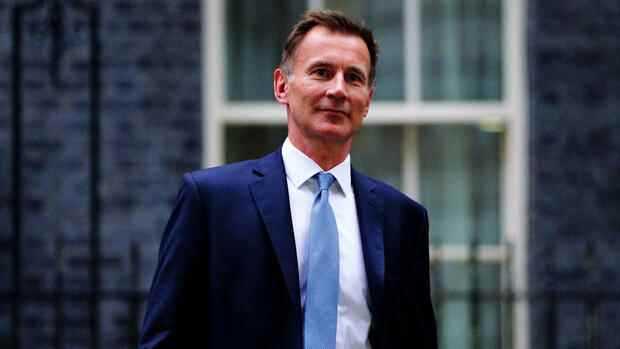The politically stricken prime minister then fired her finance minister, Kwasi Kwarteng, on Friday, appointed her former rival Hunt as his successor and announced that corporation tax for companies would now be raised from 19 to 25 percent after all. Previously, she had already reversed the planned reduction in the top tax rate from 45 to 40 percent.
Truss did not convince the financial markets: interest rates on British government bonds rose and the pound lost ground again. “We do not anticipate that the financial concerns will ease as a result of today’s actions. Rather, we think further market instability is likely,” said Benjamin Nabarro, an economist at US bank Citigroup in London. As a result, Truss is now being squeezed between her parliamentary group on the one hand and the markets on the other.
Top jobs of the day
Find the best jobs now and
be notified by email.
After just over a month in office, Truss is facing a political shambles. Numerous MPs from their Conservative Party have resigned from the head of government and are planning to force her out of office with an internal party vote of no confidence. According to media reports, the rebellious Tories want to publicly call on Truss to resign as early as next week.
The British Prime Minister must correct her economic policy course.
(Photo: AP)
Conservative MP Crispin Blunt made the start on Sunday. According to an opinion poll for the Channel 4 TV station, almost two-thirds of Britons distrust the Prime Minister. The Tories are now almost 30 percentage points behind the opposition Labor Party in the polls.
Treasury Secretary Hunt has criticized Truss’ course and pace as “too far-reaching and too fast.” “My focus is on growth backed by stability,” said the former health and foreign minister, trying to stave off another sell-off in financial markets this week. Even taking into account the withdrawal of tax breaks for companies and individuals that has now been announced, there is still a funding gap of around £40 billion in the British budget, which the Institute for Fiscal Studies (IFS) believes should essentially be closed by cutting government spending .
“The Prime Minister is still in charge”
Hunt announced “difficult decisions”: He hinted at cuts in public services, even though Truss had categorically ruled that out in parliament last week. “The PM is still in charge,” Hunt said. At the same time, however, he questioned Truss’ entire economic policy agenda.
Everything will be on the table, said the finance minister and did not want to rule out further tax increases. Hunt plans to present the details of his austerity program in a new draft budget on October 31. But it won’t be as bad as during the austerity after the financial crisis, he promised.
According to reports, Truss’ plan to reduce the entry rate in income tax from April 2023 from 20 to 19 percent is also up for discussion. It would be the Conservative government’s third reversal in a month, following the abolition of tax relief and corporate tax relief.
Federal Reserve Chairman Andrew Bailey welcomed the change of course back to “sustainable fiscal policy”. With a “blind flight” you can not achieve this goal, said the head of the Bank of England with a view to the unfunded tax plans of the Truss government. The central bank had tried to prevent a financial crisis with massive purchases of British government bonds. The emergency program expired on Friday.
Bank of England announces more rate hikes
At the same time, Bailey announced further interest rate hikes for early November: “We will not hesitate to raise interest rates in order to achieve the inflation target,” said the currency watchdog. From today’s perspective, he assumes “that inflationary pressures will require a stronger reaction than we might have thought in August”. Consumer prices in Great Britain rose by around ten percent in August. Even higher inflation figures are expected on Wednesday.
US President Joe Biden was not surprised by the turnaround in Great Britain: “I wasn’t the only one who thought that was a mistake… the idea of lowering taxes on the super-rich… I don’t agree with that policy, but it’s for Britain to make that judgment, not mine ‘ said Biden, who had criticized the idea of ”trickle-down economics”, already favored by former US President Ronald Reagan, as unfeasible. What is meant by this is Truss’ idea, which has now failed, that tax relief for higher earners and companies will lead to more growth and thus more prosperity for everyone.
More: New UK Treasury Secretary: ‘Government wanted too much too quickly’
